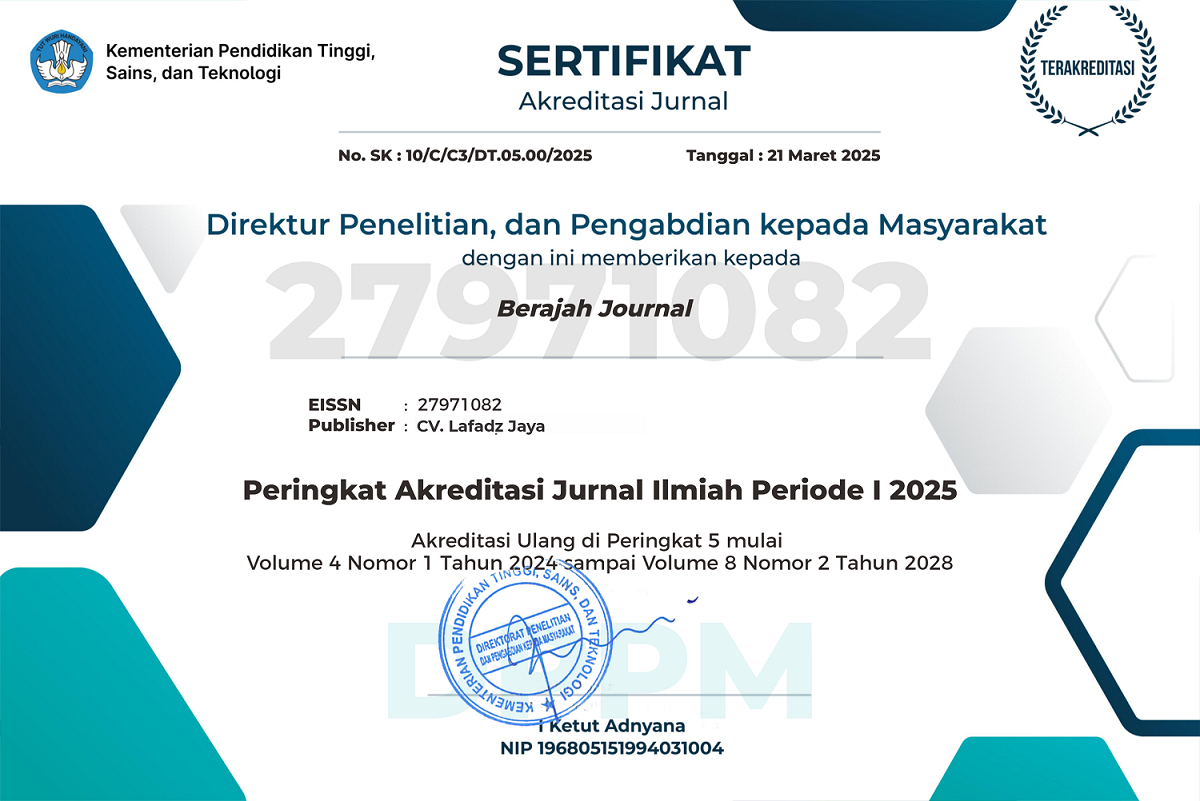“LA’ALLAKUM TASYKURUN”: SEBUAH TINJAUAN DALAM AL-QUR'AN
DOI:
https://doi.org/10.47353/bj.v4i3.364Keywords:
Gratitude, Hope, La’allakum, TasykurunAbstract
The Quran is the holy book of Muslims, containing guidance and teachings of Islam. One term that is frequently used in the Quran is 'la'allakum tasykurun' - so that you may be grateful. Gratitude is a crucial aspect for every Muslim. In essence, being grateful can provide positive benefits for one's spirituality and emotional intelligence. This article introduces a new analysis of the concept of 'la'allakum tasykurun' in the Quran. This concept implies hope and inspiration for Muslims to be grateful and thus needs to be studied. The aim of this article is to understand the expectations placed on Muslims by the term ‘la'allakum tasykurun’ so that it can be studied and practiced. This article employs a qualitative method using text analysis software, ATLAS.ti version 24.1.1.30813. The findings of this study reveal that the term “la'allakum tasykurun” contains significant meaning for Muslims. It conveys the hope that gratitude can be practiced, and therefore, there is a need for education on being grateful. This term is mentioned in the Quran 14 times. There are 12 aspects that cause a person to be grateful for all of Allah's blessings. Muslims are expected to be grateful in any situation because Allah has urged humanity in the Quran to be grateful. This research is expected to provide a valuable contribution to Quranic studies and the Muslim community.
Downloads
References
Al-Quran al-Karim.
Afandi, N. K., & Pranajaya, S. A. (2023). The Influence of Sabar, Ikhlas, Syukur, and Tawadhu’on Psychological Well-Being of Multicultural Students in East Kalimantan. Dinamika Ilmu.
Al-ᶜUmarī, S. bin M. bin ᶜĪḍah. (n.d.). Laᶜalla Aṣluḥa wa Lughātuhā wa Maᶜnīhā wa ᶜAmaluhā Dirāsah Lughawiyah Nahwiyah.
Al-Jārim, ᶜAlī, & Amīn, M. (n.d.). al-Nahwu al-Waḍiḥ fī Qawāᶜid al-Lughah al-ᶜArabiyyah. Indonesia: al-Ḥaramain.
Bakar, S. A., & Maysarah, S. (2020). Lafal Layta dalam Al-Qur’an Syukran. Tafse: Journal of Qur’anic Studies, 5(2), 1–21.
Complex, K. S. U. Q. (n.d.). Ayat - King Sa’ud University. King Saud University Quran Complex. Retrieved from http://quran.ksu.edu.sa/ayat/?l=en
Enghariano, D. A. (2019). Syukur dalam Prespektif Al-Qur’an. JURNAL EL-QANUNIY: Jurnal Ilmu-Ilmu Kesyariahan Dan Pranata Sosial, 5(2), 270–283.
GmbH, S. S. D. (1992). ATLAS.ti. Berlin, Jerman: Scientific Software Development GmbH. Retrieved from https://atlasti.com/
Ibn Manẓūr, J. al-D. M. bin M. al-A. al-M. (2008). Lisān al-cArab (Cet Keenam). Bayrūt: Dār Ṣādir.
Iskandar, S. F., & Sobarna, A. (2021). Implikasi pendidikan dari Al-Qur’an surat Luqman ayat 14 tentang berbuat baik kepada orang tua dalam pembentukan karakter syukur. Jurnal Riset Pendidikan Agama Islam, 1(1), 63–70.
Lajnah Pentashihan Mushaf al-Quran. (2019a). al-Quran dan Terjemahannya Edisi Penyempurnaan 2019 Juz 1-10. Jakarta: Badan Litbang dan Diklat Kementerian Agama RI.
Lajnah Pentashihan Mushaf al-Quran. (2019b). al-Quran dan Terjemahannya Edisi Penyempurnaan 2019 Juz 11-20. Jakarta: Badan Litbang dan Diklat Kementerian Agama RI.
Lajnah Pentashihan Mushaf al-Quran. (2019c). al-Quran dan Terjemahannya Edisi Penyempurnaan 2019 Juz 21-30. Jakarta: Badan Litbang dan Diklat Kementerian Agama RI.
Mahayana, D. (2023). La ‘allakum Tuflihun 5: Agar Kamu Bahagia. Misykat.
Munawwir, A. W., Ma’shum, A., & Munawwir, Z. A. (2003). Al-Munawwir, Kamus Arab-Indonesia. In (No Title). Surabaya: Pustaka Progressif.
Niᶜimah, F. (n.d.). Mulakhaṣ Qawāᶜid al-Lughah al-ᶜArabiyyah. Bayrūt: Dār al-Thaqāfah al-Islamiyyah.
Putri, P. R., Nurrahima, A., & Andriany, M. (2021). Efek syukur terhadap kesehatan mental: A systematic review. Jurnal Ilmiah Kesehatan, 14(1), 58–66.
Rahmania, F. A., & Nashori, F. (2021). Mediator syukur dan sabar pada dukungan sosial dan stres tenaga kesehatan selama pandemi Covid-19. Jurnal Psikologi Islam Dan Budaya, 4(2), 81–94.
Rizki, M. (2015). al-Dirasah al-Tahliliyyah ‘ala ma’ani ‘La’alla’ fi al-Quran al-Karim. UIN Antasari.
Roji, F. (2015). Isti’mal Kalimah La’ala Fi al-Qur’an (Dirasah ’an Af’al al-Kalam). UIN Sunan Kalijaga.
Sagir, A., Hasan, M., Ibrahim, A. F., Rahman, M. A. A., Ibrahim, K. I., Araby, M., & Taufiqurrahman. (2022). Having Hope in Allah amidst the Pandemic (The Study of Laᶜlla’s Meaning and the Wisdom). International Journal of Special Education, 37(3s), 841–852.
Sarnoto, A. Z. (2021). Syukur dalam Al-Quran dan Implikasinya pada Pembelajaran di Masa Pandemi Covid-19. Prosiding Seminar Nasional: Kurikulum Merdeka Belajar-Kampus Merdeka Berbasis Integrasi Keilmuan Di Masa Adaptasi Kebiasaan Baru, 176–182.
Ubaid, U. A. (2022). Sabar dan Syukur. Amzah.
Yunus, M. (2010). Kamus Arab-indonesia. Jakarta: PT. Mahmud Yunus wa Dzurriyyah.
Zaman, K., & Bahari, L. A. (2023). Syukur dalam Perspektif al-Qur’an. Ta’wiluna: Jurnal Ilmu Al-Qur’an, Tafsir Dan Pemikiran Islam, 4, 293–308.
Downloads
Published
How to Cite
Issue
Section
License
Copyright (c) 2024 Muhammad Hasan, Akhmad Sagir

This work is licensed under a Creative Commons Attribution 4.0 International License.






















